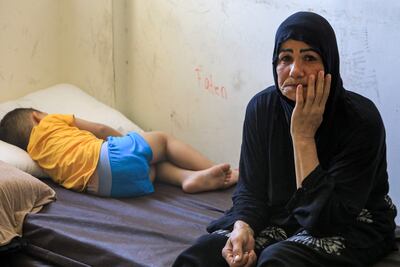Live updates: Follow the latest on Israel-Gaza
It has been a day since Hassan Rizawi, 35, fled with his family as heavy Israeli bombardment hit the southern Lebanese village of Aita Al Jabal, about 20km from the border. They have not slept.
“It was all around us,” he says of the shelling. The family left their home on Monday afternoon before it was damaged by strikes. They carried none of their belongings with them on their journey to the north.
“The children were terrified,” Mr Rizawi tells The National, pointing to his two nieces on his lap. Ten hours later, the family arrived safely in Beirut and are waiting to be accommodated at a school in the Dekwaneh neighbourhood, which is hosting hundreds of other displaced people.
“We know nothing. We have nowhere else to go, we’re just waiting,” he says. The government, which is already grappling with a steep economic crisis, has not provided any assistance, he said.
Like Mr Rizawi, thousands have fled Israel's intensive air assault on Lebanon, which has killed at least 558 people, including women and children, and wounded thousands. Israel’s aerial bombardment campaign, the most violent since 2006, comes as Israel shifts its focus to its northern front. It follows an unprecedented week of violence in Lebanon, including strikes on Beirut's southern suburbs and a wave of explosions, sparking fears of a potential Israeli ground invasion.
On Monday, Lebanon's government opened schools and colleges to shelter displaced people. But Ihab Masri, a Syrian citizen, is still unsure if he and his family will be admitted because they are not Lebanese. Mr Masri fled the Syrian village of Deraa at the start of the civil war in 2011.
More than 10 years later, the father of four is once again fleeing under heavy shelling, but this time from south Lebanon. “It’s the same trauma all over again, the war in Syria was awful, this is awful,” he told The National.

He is anxiously searching for officials to speak to, hoping to find out if the school has room for them. “We’re not sure if they’re going to accept us. We heard they might not, but we have nowhere else to go,” he said. “If they don’t give us a room, we’ll sleep in the street.”
The Israeli army claims it is targeting Hezbollah infrastructure in Lebanon. Two staff members of the UN's refugee agency were among the 558 people killed in Lebanon on Monday, the organisation’s chief confirmed on Tuesday.
“Israeli air strikes in Lebanon are now relentlessly claiming hundreds of civilian lives,” Filippo Grandi said on X.
“And I am very saddened to confirm that two UNHCR colleagues were also killed yesterday.”
Hezbollah and Israel have been exchanging fire since October 8, when the Lebanese group opened a northern front in support of its Palestinian ally, Hamas. It has stated that it will continue its attacks until a ceasefire is reached in Gaza.
UN Secretary General Antonio Guterres warned world leaders gathering in New York that “Lebanon is at the brink. The people of Lebanon – the people of Israel – and the people of the world – cannot afford Lebanon to become another Gaza.”

